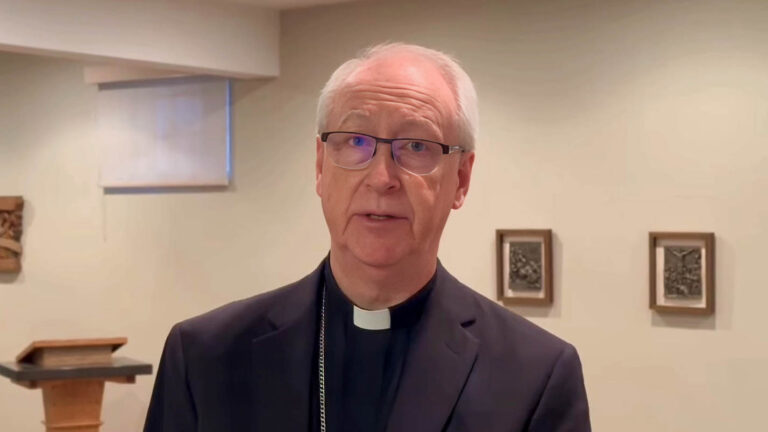Homily
[Deuteronomy 10. 17-19; Psalm 27; Hebrews 13:1-3, 14-16; Matthew 25:31-40]
We gather this evening on what is called “Red Wednesday”. This is a global initiative of the Papal Charity called Aid to the Church in Need. This agency exists to support Christians suffering from persecution, oppression, or are otherwise in need. One way to highlight the reality of Christian persecution is this endeavour, which invites dioceses and other institutions to illumine cathedrals, churches, monasteries, monuments, and public buildings in red – a rather striking reminder of the persecution that very often leads to the shedding of blood.
Christians are the most persecuted group of persons in the world right now. I am grateful that we are able to gather this evening to offer the invaluable support of prayer for our sisters and brothers globally who are suffering because of their Christian faith. There is no area on the planet where Christians are not in some way suffering for their faith. Even in North America, we see the growth of a secularism closed in upon itself and thus not at all open to religious belief and the insights of its various traditions. Religion is perceived as a threat to peaceful order and is therefore increasingly circumscribed and marginalized.
Especially heartbreaking, of course, is the actual physical harm, often lethal, inflicted upon our sisters and brothers in the countries of the Middle East, Africa, Latin America, and Asia. Tonight, we unite as brothers and sisters in the Lord – clergy and laity together – some of whom have roots in these troubled regions of the world and who worry deeply for their families and country. Our purpose is – first and foremost – to pray to Almighty God for an end to the persecution. We wish, too, to stand in solidarity with one another. The Letter to the Hebrews reminds us this evening that true solidarity is more than sympathetic feelings; it is a determination to enter into the reality of another’s suffering as if it were our own: “Remember those who are in prison,” we are told, “as though you were in prison with them; those who are being tortured, as though you yourselves were being tortured.” We pray that our assembly of prayerful solidarity will send a message of assurance and comfort to fellow Christians in situations of oppression that they are not forgotten and remain always treasured members of the universal family we call the Church.
The Gospel text from Saint Matthew calls us even further. Echoing the divine call we heard in Deuteronomy to love, clothe, and feed the stranger, Jesus summons us to action in concrete service of the sick, prisoner, naked, hungry, thirsty, and stranger. The heart weeps as we see news reports of the burgeoning numbers of people suffering in these ways because they have been uprooted from their homes, livelihoods, relatives, and all that is familiar due simply to their faith in Jesus Christ. Aid to the Church in Need, the author of tonight’s initiative, describes the situation in these terms: “Today, across the world, 327 million Christians live in a country where there is persecution at various degrees. Because of their faith, they endure discrimination, they get scorned, they get arrested, they get incarcerated, they get tortured and sometimes they even get killed. It is estimated that 75 % of acts of violence for religious reasons are perpetrated against Christians, which makes them the most persecuted group. Instead of getting better, the situation is getting worst year after year.”
Although we may not be able to be present in the zones of conflict and persecution, nevertheless we can offer concrete assistance to agencies in a position to make a real difference. These include Catholic organizations such as Aid to the Church in Need, Caritas Internationalis and the Catholic Near East Welfare Association, as well, of course, as agencies within the Orthodox Churches, the Anglican communion and in other Christian communities. Persecution does not discriminate, it seems. All Christians, who profess their faith in Jesus, are targets. Organizations aiming to help them are crying out for our assistance in order to bring concrete support directly to people and Churches in need.
Above all, we must, together, point the world to Jesus Christ, who is, in himself, the way to true reconciliation and lasting peace among peoples. I am reminded of the counsel given by the Holy Father, Pope Francis, when he came to Canada on his penitential pilgrimage of reconciliation with the Indigenous Peoples of this land. During the ceremony at Sacred Heart Church of the First Peoples, he spoke these words, which I suggest we must all take to heart: “This is the way forward: to look together to Christ, to love betrayed and crucified for our sake …. If we truly want to be reconciled with one another and with ourselves, to be reconciled with the past, with wrongs endured and memories wounded, with traumatic experiences that no human consolation can ever heal, our eyes must be lifted to the crucified Jesus; peace must be attained at the altar of his cross. For it is precisely on the tree of the cross that sorrow is transformed into love, death into life, disappointment into hope, abandonment into fellowship, distance into unity. Reconciliation is not merely the result of our own efforts; it is a gift that flows from the crucified Lord, a peace that radiates from the heart of Jesus, a grace that must be sought.”
So, this evening, let us together seek this grace. May we implore the Lord from the depths of our hearts for not only an end to persecution, but also the establishment everywhere of true reconciliation and lasting peace. Only through faith and surrender to Jesus, the crucified and risen Lord, are walls of hostility destroyed and pathways of communion established. Let us together point our world to him as our one and only sure hope.
✠ Most Reverend Richard W. Smith
Saint Joseph Basilica
November 20, 2024



